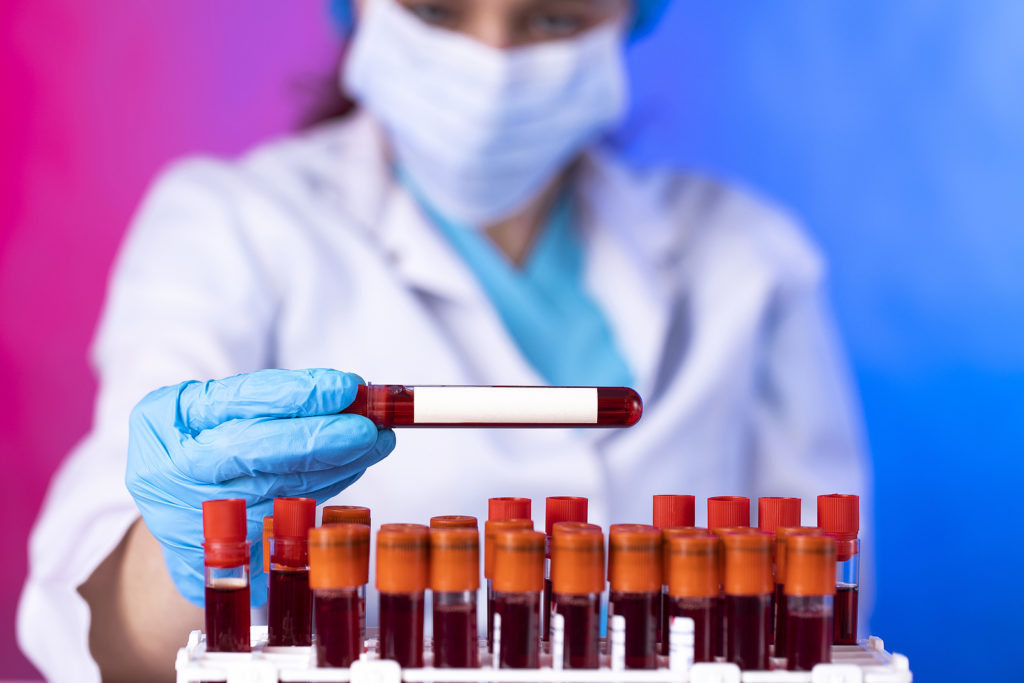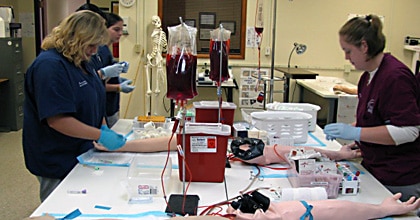Comparing Phlebotomy Courses Near Me That Match Your Budget
Wiki Article
The Course to Qualification: Understanding the Phlebotomy Training Program Trip and Its Relevance
As you take into consideration the path to accreditation in phlebotomy, it's essential to comprehend the role you'll play in healthcare. Your training will certainly cover essential skills, from blood collection strategies to patient communication.
The Duty of Phlebotomists in Health Care
Phlebotomists play a vital function in the health care system, acting as the vital link between people and vital diagnostic screening. You'll carry out blood attracts, making sure samples are accumulated precisely and securely. Your know-how helps in detecting medical problems, keeping an eye on health, and leading treatment decisions.In your day-to-day interactions, you'll require to establish depend on with patients, making them really feel comfortable during what could be a difficult experience. You are accountable for labeling and taking care of samples very carefully to stop contamination or mistakes, which can impact examination results.
Beyond this, you'll frequently function along with physicians and registered nurses, communicating vital information regarding clients' problems. By understanding your skills, you add meaningfully to person treatment, making you an essential part of the clinical team.
Review of Phlebotomy Training Programs
When checking out phlebotomy training programs, you'll discover various kinds created to fit different schedules and finding out designs. Each program helps you create essential skills like blood collection and client communication. Comprehending these options is key to choosing the right course for your career.Kinds Of Training Programs
A number of sorts of training programs are readily available for those seeking to end up being skilled in phlebotomy. You can pick from certification programs, which typically last a few months and concentrate on crucial skills. There are additionally diploma programs that provide a more comprehensive education and learning, usually lasting as much as a year. If you're looking for a deeper understanding, an associate level in an associated field may be the right fit. On-line training courses offer flexibility for those balancing job or family members commitments, permitting you to research at your very own pace. Additionally, some health centers and centers provide on-the-job training programs, providing practical experience while you find out. Whatever path you pick, each program intends to outfit you with the required skills for an effective phlebotomy career.
Key Abilities Established
Understanding phlebotomy needs a collection of vital skills that are established through detailed training programs. You'll learn technical skills like appropriate blood vessel option, needle insertion, and blood collection techniques. These hands-on techniques ensure you can execute procedures safely and efficiently. In addition, interaction abilities are fundamental; you'll need to interact with people, describe treatments, and placed them comfortable. Recognizing composition and physiology is crucial, as well, as it aids you locate capillaries and recognize the body's reaction to blood draws. You'll acquire knowledge of safety and security methods and infection control, assuring you maintain a clean and sterile environment. Each of these abilities is crucial for your success as a qualified phlebotomist, making you a useful asset in any type of health care setting.Trick Components of a Phlebotomy Training Course
In a phlebotomy program, you'll concentrate on necessary topics that prepared for your future profession. You'll take part in hands-on training that enables you to use what you've learned in real-world settings. Both the curriculum and functional experience are vital for your success as a phlebotomist.Curriculum Overview
While going after a phlebotomy training program, you'll come across a curriculum developed to outfit you with fundamental skills and expertise. Phlebotomy Training Course. This educational program usually consists of anatomy and physiology, concentrating on the blood circulation system and comprehending blood parts. You'll also find out about different kinds of blood collection methods, including venipuncture and capillary leak strategiesAdditionally, infection control and security methods are essential elements, guaranteeing you recognize how to maintain a sterilized atmosphere. You'll research patient interaction, emphasizing communication and empathy, which are essential for easing client stress and anxiety. Ethical and lawful factors to consider will be dealt with, preparing you for real-world obligations. This foundational expertise will certainly allow you to succeed as a phlebotomist and offer quality care in scientific setups.
Hands-On Training Experience
Getting hands-on experience is an essential component of your phlebotomy training program. This useful training permits you to apply what you have actually found out in a real-world setup, improving your abilities and confidence. Phlebotomy Training Course.Additionally, you'll obtain the chance to engage with clients, which is crucial for establishing your communication skills. This mix of technological proficiency and social abilities is vital for your success as a certified phlebotomist. Eventually, hands-on training is where concept meets technique, solidifying your understanding and preparedness for certification.
Qualification and Licensing Requirements
Prior to you can begin your profession in phlebotomy, it is essential to understand the accreditation and licensing needs that vary by state. A lot of states call for phlebotomists to hold a certification from an identified company, such as the National Phlebotomy Association or the American Society for Professional Pathology. These qualifications usually entail passing an exam that evaluates your understanding and abilities in the area.Along with accreditation, some states have certain licensing needs. You might need to complete a specific number of hours in professional practice, submit proof of training, or go through a history check. It is very important to investigate your state's regulations to ensure you satisfy all required requirements.
Remaining educated concerning these needs not just aids you secure a position but also enhances your reliability as an expert. By satisfying these demands, you'll be well on your method to a successful profession in phlebotomy.
Hands-On Training and Practical Experience
Hands-on training and useful experience are important elements of your phlebotomy education, as they allow you to apply academic expertise in real-world scenarios. Throughout your training, you'll take part in supervised venipuncture, learn proper techniques, and come to be aware of various blood collection tools. This straight participation is vital for developing your confidence and sharpening your skills.You'll work very closely with seasoned specialists that can direct you through the nuances of person communication and sample handling. Each practice session not just strengthens your understanding but additionally prepares you for the hectic environment of healthcare setups.
Furthermore, many programs include scientific rotations, permitting you to experience varied settings, from hospitals to outpatient facilities. This exposure aids you adapt to various difficulties and patient demands, ensuring you're well-prepared for your future duty. Accept these possibilities, as they're vital to ending up being a skilled and thoughtful phlebotomist.
Difficulties Encountered During Training
While obtaining hands-on experience is necessary, it is very important to identify the challenges that can arise throughout your phlebotomy training. You might come across anxiety when doing procedures on genuine people, especially if you're brand-new to the setting. The pressure to obtain every little thing right can be frustrating. In addition, mastering the skills needed for blood draws takes method; you might fight with method originally.Time administration can additionally be a difficulty, as balancing theory, useful sessions, and individual dedications can really feel daunting. You might face varying learning speeds among your peers, causing sensations of insecurity if you assume you're falling Phlebotomy Training Course back. Adjusting to the various individualities of teachers can be tough, as each might have an one-of-a-kind training design.
Identifying these challenges beforehand can prepare you for success and aid you develop resilience throughout your training trip.
Job Opportunities After Qualification

As you obtain experience, you might even take into consideration focusing on areas like pediatric or senior citizen phlebotomy, catering to certain client demands. Some phlebotomists choose to progress their professions by coming to be lab professionals or going after more education in health care fields.
Additionally, your accreditation can lead to functions in training or supervising new phlebotomists, permitting you to share your knowledge. With the health care sector constantly expanding, your abilities will always remain in demand, leading the way for a secure and fulfilling occupation. Welcome the opportunities waiting on you!
Regularly Asked Questions
What Is the Common Period of a Phlebotomy Educating Training Course?
Phlebotomy training courses normally last around 4 to 8 weeks. You'll engage in hands-on practice, classroom guideline, and on-line learning. Completing this training prepares you for accreditation and a fulfilling career in healthcare.Are Online Phlebotomy Courses Available?
Yes, on the internet phlebotomy programs are offered. They supply adaptability and convenience, allowing you to study at your own rate. Just verify the program is certified to satisfy accreditation demands and get useful abilities for your career.Exactly How Much Does Phlebotomy Training Normally Price?
Phlebotomy training normally sets you back in between $700 and $2,500, depending upon the program and place. You must think about aspects like program length, included products, and hands-on experience when picking the appropriate training for you.What Prevail Prerequisites for Phlebotomy Training?
Common requirements for phlebotomy training frequently consist of a senior high school diploma or GED, booster shots, and a background check. Some programs may additionally need basic medical care understanding or certifications, guaranteeing you're prepared for hands-on training.Can I Function While Completing My Phlebotomy Training?
Yes, you can function while finishing your phlebotomy training. Lots of trainees equilibrium tasks with their studies, but make certain to handle your time efficiently to assure you satisfy both job and training commitments efficiently.Report this wiki page